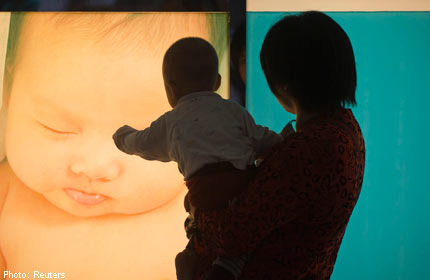
While many Chinese parents continue to struggle to find safe and trusted milk powder for their babies, some in Shenzhen, a major city in the south of Guangdong Province, are paying to enjoy a new "nourishment" - human breast milk.
A few of them are doing so by breastfeeding, Chinese media reported.
Human breast milk has become a new luxury for China's rich, with some firms offering wet nurse services, a report said, provoking outrage and disgust among Internet users on Thursday.
Traditional beliefs in some parts of China hold that human breast milk has the best and most easily digestible nutrition for people who are ill.
Xinxinyu, a domestic staff agency in the booming city of Shenzhen, which borders Hong Kong, provides wet nurses for newborns, the sick and other adults who pay high prices, the Southern Metropolis Daily said.
"Adult (clients) can drink it directly through breastfeeding, or they can always drink it from a breast pump if they feel embarrassed," the report quoted company owner Lin Jun as saying.
Wet nurses serving adults are paid around 16,000 yuan (S$3,320) a month - more than four times the Chinese average - and those who were "healthy and good looking" could earn even more, the report said.
"Consuming human breast milk is quite popular among my social circle… spending 10,000 to 20,000 yuan hiring a wet nurse is not uncommon at all," Southern Metropolis Daily quoted an anonymous client as saying.

The client said he paid 15,000 yuan to a wet nurse and had her live at his home for a month, according to the report.
Denials
A spokesman for the company, who refused to be identified, claimed the report was entirely false. He insisted that his company's household services did not include recommending wet nurses. The allegations were malicious gossip aimed at driving his company out of business, he told Hong Kong daily the South China Morning Post.
But Xinxinyu's advertisements can be seen on a number of marketing websites, promoting the high quality services of its wet nurses as well as its nannies, stewards, confinement nurses and tutors, the Hong Kong daily reported.
The report sparked a heated debate in the media and on Chinese social media, with most users condemning the service as unethical, AFP reported.
"This adds to China's problem of treating women as consumer goods and the moral degradation of China's rich," said writer and regular media commentator Cao Baoyin on his blog.
Xinxinyu has been ordered to suspend its operations and has had its business licence revoked for multiple reasons, including missing three years of annual checks, regulators in Shenzhen told AFP on Thursday.
The wet nurse service was not among the factors they cited.
Company officials could not be reached for comment.

